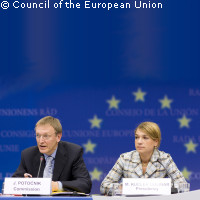Latest Competitiveness Council brings progress for research
Close to the end of the Slovenian presidency of the European Union, the 2871st meeting of the Competitiveness Council on 29 and 30 May in Brussels yielded a number of decisions in the field of research. This includes among other things the go ahead for the new Joint Technology Initiative on Fuel Cells and Hydrogen (FCH JTI) as well as the launch of the Ljubljana Process. The FCH JTI had been given the go ahead by the European Parliament earlier this month and it is now scheduled to be officially launched in October after the Member States have adopted the necessary regulation. The European research and economy ministers also adopted a recommendation on the management and transfer of intellectual property (IP). The so-called Intellectual Property Charter (IP-Charter) calls upon public research institutes and universities to develop internal strategies for protecting and dealing with intellectual property. This is intended as a measure against unchecked knowledge drain and counterfeiting. At the same time the charter sets out standards for the exploitation of publicly funded research that aims to give international collaboration in this field a new quality. In addition, this latest Competitiveness Council stressed the importance of European research infrastructures and their regional dimension. 'Excellent research infrastructures play a key role in the development of the European Research Area (ERA) by promoting excellence in science, enabling globally competitive basic and applied research,' the Council concluded, calling on the Commission to further facilitate the cooperation and combination of national, regional and local sources of funding. Speaking at a press conference, the Slovenian Minister of Higher Education, Science and Technology, Mojca Kucler Dolinar said: 'The harvest of achievements under our presidency will be quite a rich one, although we were forewarned that we shouldn't be too ambitious. Nevertheless, the Slovenian Presidency closed three important legislative files, which are going to lead to an improvement in the quality of life of European citizens and will also improve the situation of SMEs. 'We also endeavoured under our presidency to focus on a long stagnating European Research Area,' Mrs Kucler Dolinar continued. 'We launched the process of the revision of the ERA, which is something that the two previous and future presidencies have also included into their list of priorities. Let me say that we are very happy that we have achieved a break-through in the European Research Area. We have managed to outline a vision of its future development. We have also laid the foundation for the future governance of the ERA.' With respect to the selection of the headquarters for the European Institute of Innovation and Technology (EIT), Mrs Kucler Dolinar emphasised the fact that ministers had come to agree on the criteria for the selection, namely that the seat should be in one of the new Member States and it should be in a Member State that does not have a European agency or institute yet. The Slovenian presidency was determined, however, to continue work on reaching a consensus with all Member States, she said as 'every day without a seat of the EIT is a day lost because it prevents us from focusing on setting up the first knowledge and innovation communities.' Poland had on Thursday blocked a final decision, while the majority of Member States had supported the candidature of Budapest, Hungary. European Research Commissioner Janez Potocnik praised both the success of the Competitiveness Council and the Slovenian presidency. 'We continue to put in place the bricks for realising the European Research Area. We are gradually lifting the barriers to the Fifth Freedom, the freedom of the movement of knowledge. We have officially launched today the Ljubljana process. This process could prove to be a milestone for the European research policy,' he said thanking Slovenia for their work at the helm of the European Union in the past months.



